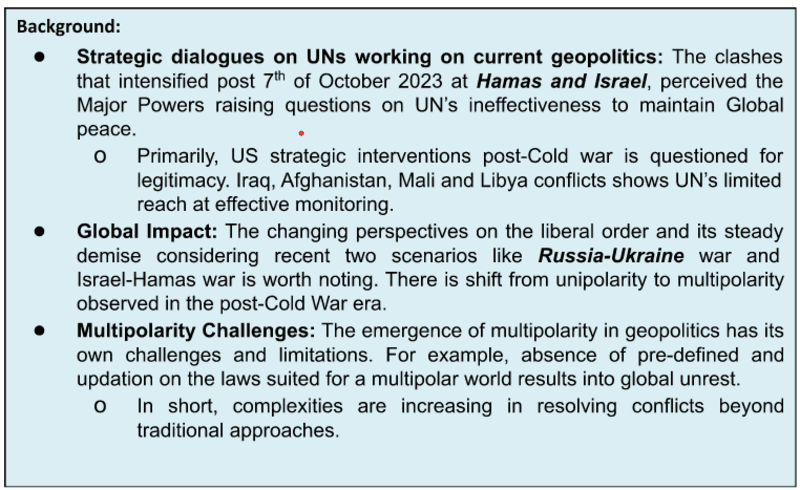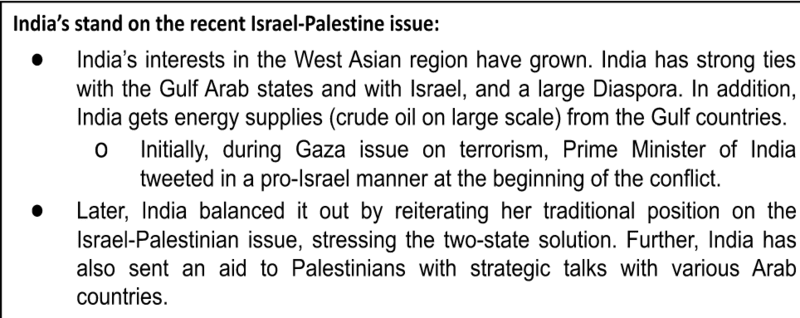GS Paper II
News Excerpt:
The two escalating conflicts, the Israel-Hamas War and the Russia-Ukraine War in recent times, led to the question of the effectiveness of the United Nations in bringing about peace.

What are the Functions and Responsibilities of the United Nations for maintaining Peace?
- Mediation and Conflict Prevention: The United Nations (UN) plays a vital role in conflict prevention, using diplomacy, offices and mediation. To prevent conflicts and violence, peacekeeping operations are called upon to maintain peace and security, assist in disarmament, and facilitate political processes by protecting civilians, etc.
- Counter the growth of terrorism: 18 universal instruments against international terrorism have been elaborated.
- Promoting Human Rights: The UN contributes to protecting and promoting human rights through immediate and long-term action. It empowers the population to assert and claim their human rights. To enable the State and other national institutions to implement their human rights obligations and uphold the rule of law.
- Promoting Women in Sustainable Growth: To achieve this goal, the UN address social, cultural and political barriers and protection risks that limit women’s full participation in achieving and sustaining peace.
- Operational support: The effectiveness of peace operations always depends on the active support it receives. The Department of Operational Support (DOS) helps peace operations succeed by providing support solutions that are rapid, effective, efficient and responsible.
Why has the UN been ineffective in these kinds of violent conflicts in recent years?
- Lack of liberal International order: Since the inception of uniform world order and laws during the Cold War, there has been a deterioration in the world’s international order. For example, the USA’s interference in West Asia reflects the ineffectiveness of the UN as an International Peacekeeping body.
- Rising power playing strategies: Post the Cold War, there has been a gradual decline in the ability of the UN to undertake a significant role in resolving conflicts due to which the major powers, especially the US (can even consider China) and their allies have always tried to subjugate the minor powers. The main dilemma exists when there is no one to counterbalance these significant powers.
- Frozen membership at UN: Due to power imbalance, it has been impossible for the UN, with its biased and frozen membership of decision-making bodies like the UNSC, to decide on urgent and meaningful action.
- Veto Power Issues: Due to the National interests of the five permanent members of the UN Council, the UNSC, in its present structure, cannot provide any hope for addressing the international issue.
What are the significant challenges highlighted?
- Lack of Diplomatic willingness: Diplomatic willingness needs three criteria to be satisfied – Political situation, Sympathy, and National interests.
- The continuation of the conflict in West Asia is nurturing a political end. This has been observed through sustained protests in Israel over controversial judicial reforms.
- Considering Gulf Arab states, there is little sympathy for the Palestinian cause.
- Contemporarily, the US is caught up with national elections, because of which progress on the Abraham Accords has been stalled.
- Power discord and protectionism: Multipolarity after the 2008 recession represents diverse challenges and one's own National Interest. Considering economic profits, protectionism of trade and interests is increasing, and hence, the principle of multipolarity without multilateralism leads to chaos. Lack of consensus among major powers hinders UN efforts. Veto powers in the UNSC obstruct conflict resolution.
- Other challenges:
- Israel’s Approach towards terrorism: Israel’s response to Hamas goes beyond national security. Commitment to eliminating Hamas reflects a profound resolve.
- UN’s approach: The UN is being criticised for its passive role in both recent conflicts.

Way Forward:
- Updation on the Resolution system is needed: Recognizing the recent complexities, there is urgency in exploring some innovative mechanism for conflict resolution instead of the traditional approach.
- Need for UN Reforms: Advocating reforms in UN structures for increased agility. Addressing veto-related challenges to enhance the UN’s role in global peacekeeping.
- Need for Universal Public Engagement and Awareness: Fostering global public engagement in conflict resolution can play a significant role in leveraging and encouraging peaceful solutions.
- Need for actual Multilateral Diplomacy: Encouraging debates and dialogues among emerging and developed nations will help strengthen multilateral diplomatic efforts for conflict resolution.
- Need for India’s Global Action: Considering increasing global significance and the world’s one of the most successful democracies, India can emphasise the need for realistic expectations given the superior dynamics at power play.
Mains PYQ
Q. Too little cash, too much politics, leaves UNESCO fighting for life.’ Discuss the statement in the light of the US’ withdrawal and its accusation of the cultural body as being ‘anti-Israel bias’. (UPSC 2019)
Q. “Where there is righteousness in the heart, there is beauty in the character. When there is beauty in the character, there is harmony in the home. When there is harmony in the home, there is order in the nation. When there is order in the nation, there is peace in the world.” — A. P. J. Abdul Kalam. (UPSC 2019)
Q. At the international level, the bilateral relations between most nations are governed on the policy of promoting one’s own national interest without any regard for the interest of other nations. This leads to conflicts and tensions between the nations. How can ethical consideration help resolve such tensions? Discuss with specific examples. (UPSC 2015)
